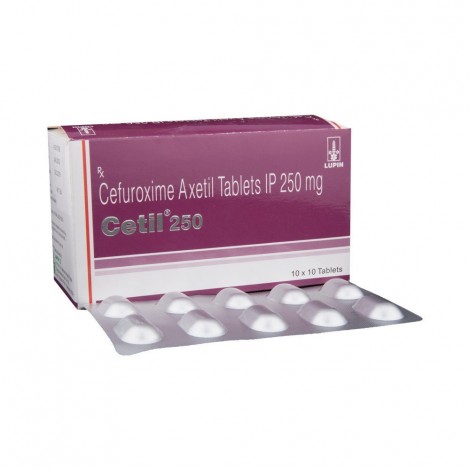Introduction to Cetil 250mg Tablet
Cetil 250mg Tablet contains an active component as Cefuroxime. It is an antibiotic medication used to treat a variety of bacterial infections. It belongs to the class of antibiotics known as cephalosporins. It works by inhibiting the growth and spread of bacteria in the body. This medication has a broad spectrum of activity against both gram-positive and gram-negative bacteria. It is effective against many common pathogens, including Streptococcus pneumoniae, Haemophilus influenzae, Escherichia coli, Klebsiella pneumoniae, and Moraxella catarrhalis. This medication is commonly used to treat respiratory tract infections, such as bronchitis and pneumonia, urinary tract infections, skin and soft tissue infections, and certain sexually transmitted infections like gonorrhea.
Cetil250mg Tablet should not be used in individuals with a known allergy to cephalosporin antibiotics or penicillins. There may be a risk of cross-reactivity and an increased chance of allergic reactions. Cetil 250mg Tablet and other antibiotics can disrupt the normal balance of bacteria in the gastrointestinal tract, potentially leading to the overgrowth of Clostridium difficile. If a person has a history of Clostridium difficile-associated diarrhea, Cetil 250mg Tablet may be contraindicated or require careful consideration. This is generally not recommended for use in preterm infants due to the potential risk of an increased incidence of a certain type of bowel disease called necrotizing enterocolitis. individuals with severe kidney impairment or those who require dialysis may require dosage adjustments
Uses of Cetil 250mg Tablet
Cetil 250mg Tablet is used in the treatment of the following:
- Lower respiratory tract infection
- Urinary tract infections
- Uncomplicated gonorrhea
- Septicemia (blood infection)
- Meningitis (brain infection)
- Bone and joint infections
- Skin and suture infections
- Prevention of infections during surgical procedures
- Lyme disease (bacterial infection)
- Therapeutic Effects of Cetil 250mg Tablet
The therapeutic effect of Cetil 250mg Tablet is the inhibition of bacterial growth and the treatment of various bacterial infections. By targeting and interfering with the synthesis of bacterial cell walls, this medication effectively inhibits the growth and spread of susceptible bacteria. It exhibits a broad spectrum of activity against gram-positive and gram-negative pathogens commonly involved in respiratory tract infections, urinary tract infections, skin and soft tissue infections, and certain sexually transmitted infections.
Interaction of Cetil 250mg Tablet with other drugs
Inform the doctor about your medicines, including prescription, over-the-counter, nutritional or vitamin supplements, and herbal products. Certain medications may interact with Cetil 250mg Tablet, reducing effectiveness by causing undesirable side effects.
More Information about Cetil 250mg Tablet
- Stored at controlled room temperature, between 20°C to 25°C (68°F to 77°F).
- Keep away from moisture, heat, and light.
- It should not be frozen.
- Keep away from children and pets.
How to consume Cetil 250mg Tablet
To use Cetil 250mg Tablet, follow the instructions provided by your healthcare provider or as indicated on the medication label. It is available in various forms, including tablets, and extended-release tablets. Swallow them whole with a full glass of water, with or without food, as directed. If using extended-release tablets, do not crush or chew them.
Side Effects of Cetil 250mg Tablet
Cetil 250mg Tablet cause some side effects like all medications, although not everyone will experience them.
Serious:
• Allergic reactions
• Skin rashes
• Fungal infections
• Diarrhea
• Fever or sore throat
• Blisters and peeling skin
• Changes in kidney function
• Easy bleeding or bruising
• Low WBC and platelet levels in blood
Common:
• Upset stomach
• Nausea
• Diarrhea
• Allergic reactions (rare)
• Headache
• Rash
• Itching
• Swelling
Word of Advice
Inform your healthcare provider about any known allergies or sensitivities to cephalosporin antibiotics, as well as any other medications or substances you are currently taking. Additionally, disclose your medical history, especially if you have a history of kidney disease, liver disease, gastrointestinal disorders, or blood clotting disorders. Use CT-Rax 250mg Tablet with caution if you have a history of severe allergic reactions or asthma. Pregnant and breastfeeding women should consult a doctor before taking it. It is crucial to complete the full course of treatment as prescribed and not to skip any doses, even if symptoms improve, to ensure the infection is fully treated. If you develop severe or persistent diarrhea during or after treatment, contact your healthcare provider, as it could be a sign of a serious intestinal infection. For both geriatric and pediatric populations, it is advisable to consult a healthcare professional to determine the appropriate dosage


